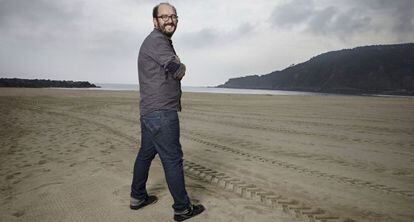Basque filmmaker’s ‘Negotiator’ takes tragicomic look at ETA terrorism
Borja Corbeaga’s new movie dares to find the funny side of the failed 2005 peace talks


Negociador (Negotiator) started out as a comedy, but soon transformed into tragicomedy. The film tells the story of the failed peace talks between armed Basque independence group ETA and the Spanish government between 2005 and 2006. During that time the government’s chief negotiator, Jesús Eguiguren, attended six funerals of victims of terrorist attacks carried out by the group, while ETA’s chief, Xabier López Peña, AKA Thierry, who successfully sabotaged the negotiations, later died in prison. What went on during the talks, what did their participants eat, drink, and where and when did they sleep? Filmmaker Borja Cobeaga has let his imagination run riot in answering those questions. The movie, which was premiered last week at the San Sebastián film festival, is inspired by real events, and is the result of extensive research, but in no way claims to be a documentary.
Seated on a park bench in the Basque coastal city, Cobeaga explains how the project got off the ground: “It came out of something very personal. I wanted to know what had really happened. I am Basque, I was born and raised here, and I know that there is a lot more to be said about what happened. This film isn’t really about the talks per se, but more about the collateral and domestic damage they produced, which had a big influence over events. At no time did I want to focus on the politics. I was much more interested in the daily lives of the people involved.”
A film like this may not heal the wounds, but it frees us. I hope that this shows that we can tell these stories”
A character bearing a marked resemblance to Eguiguren is played by Ramón Barea, while Josean Bengoetxea plays ETA veteran Josu Ternera, and Carlos Areces takes on the role of Thierry. The three make the most of their roles, steering a course between farce and catastrophe: there are cellphones that let them down at key moments; prostitutes called in to calm nerves; strange meetings; lonely suppers. Cobeaga’s characters also find themselves using the absurd language of politics, which seems to say something, but means nothing: “Here in the Basque Country we have twisted the language to incredible extremes, it is now part of everyday life. I was attracted to the idea of showing how people live. People judge you on the basis of the newspaper that you read, on whether you say buenos días or [its Basque-language equivalent] egunon,” says the director, who co-wrote the recent massive Spanish box office hit Ocho apellidos vascos, which also pokes fun at the issue of Basque independence.
Cobeaga says he wanted to take the bull by the horns in his third feature as director: “This is a story that deserves to be told, but it has always been treated with kid gloves. Such solemnity removes us from reality.” But he also makes it clear that he has no ax to grind: “I have tackled the issue honestly, because I know what it’s like to live here. At the same time, it is not only possible to laugh about things; sometimes it’s necessary. I think that laughing is a kind of revenge on reality, and a defense mechanism to defend us from suffering. But of course I haven’t suffered like so many other people have. A film like this may not heal the wounds, but it frees us. I hope that this shows that we can tell these stories. We have to move forward.”

Cobeaga says he hopes that Jesús Eguiguren is not offended by the film. “The most important thing about the character in the film is that he is inspired by the idea of peace, that peace can be reached.” Eguiguren said after the talks failed that the one positive thing to emerge from the experience was that former friends who had refused to talk to him for years, reestablished contact, proud that somebody they knew was doing something to bring peace to the Basque Country.
“Eguiguren gave everything he could to try to bring about an end to ETA’s violence, and I think that Ramón Barea succeeds in portraying that. I would love Eguiguren to see the film, and I would like to know what he thinks about it. This isn’t a documentary, it’s fiction, but I wouldn’t like anybody to think that we are ridiculing him or criticizing him; in fact it’s the opposite.”










































